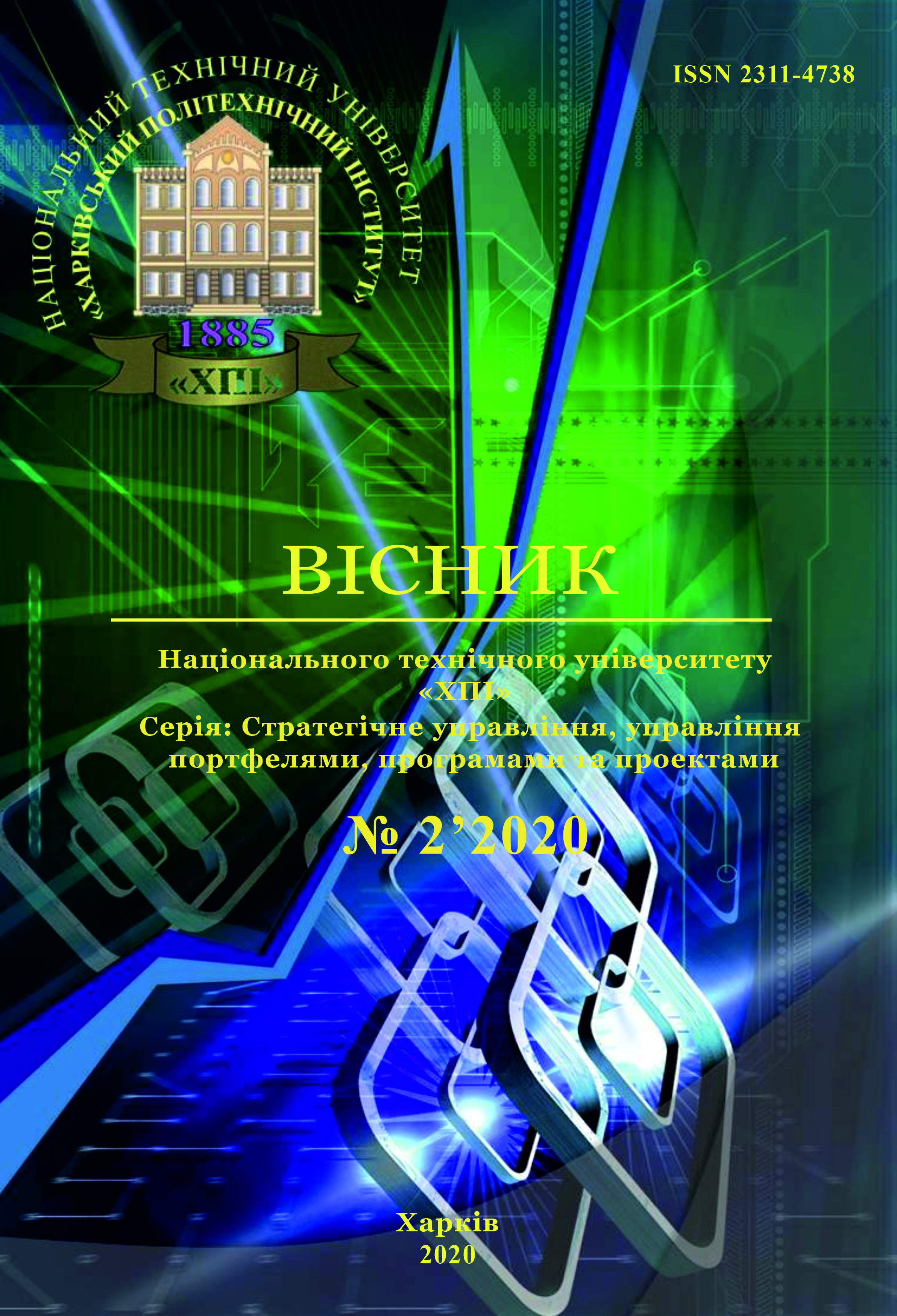STUDY OF THE INFLUENCE OF PROJECT TEAM MEMBERS COMPETENCE ON PROJECT EFFICIENCY IN THE FIELD OF INFORMATION TECHNOLOGIES
DOI:
https://doi.org/10.20998/2413-3000.2020.2.7Keywords:
IT project, competence, efficiency, risk, decision makingAbstract
Research and justification of the impact of project team members' competences on the effectiveness of the IT project is proposed. In the modern world, information technology (IT) is becoming an integral part of the functioning of any enterprise, institution, organization, etc., as well as the privacy of each person. In the conditions of doing business and strong competition in the market of information services, the problem of obtaining a quality product, improving productivity, improving management, improving competitiveness becomes especially acute. Effective management of an IT project depends on the organization and formation of the project team. IT companies are constantly in need of new employees. Modern approaches to the formation of IT project management teams are based on the concept of competence work. The concept of managing a project team involves assessing the competence of employees based on their key qualities to perform their job responsibilities. A competent approach will ensure high management performance. The study examines the relationship between the effectiveness of the project's IT and the competencies of the project team members in terms of the execution of all processes in the project, which depend on the competencies, as well as the identification of the risk of failure of the process in the project. Harrington's generalized desirability feature provides a way of comparing project performance. These results depend directly on the overall assessment of the competencies of the project team members and affect the effectiveness of the project. The conclusions about the possibility of applying the conducted research in the development of an intelligent information system for assessing the competencies of the project team members were made. This will allow for a more thorough selection of applicants to the IT project team and improve management productivity.References
Prokopenko T. O., Ladanuk A. P. Informaciiyni tehnologii upravlinnya organizaciiyno-technologichnimi sistemami [Information technology management organizational and technological systems]. Cherkassi, Vertikal, Kandich S.G., 2015. 224 p.
International Competition Baseline IPMA ICB - IPMA Competence Baseline. Version 4.0. IPMA Editorial Committee. IPMA, 2016. 432 p.
Bouhuev S. D., Bouhueva N. S. Upravleniye proektami: Osnovi profesionalnih znanii I sistema ocenki kompetentnosti proektnih menedgerov [Project Management: Fundamentals of Professional Knowledge and the Competence Assessment System for Project Managers (National Competence Baseline, NCB UA Version 3.0)]. Kyiv, IRIDIUM, 2006. 208 p.
Bushev S.D. (ed.). Rukovodstvo po upravleniyu innivacionnimi proektami I progpamammi predpriyatiiy [Guide for the management of innovative projects and programs of enterprises: vol. 1, version 1.2]. Kyiv, Nauk.Svit, 2009. 173 p.
Caupin G., Knoepfel H., Koch G. ICB IPMA Competence Baseline Version 3.0. International Project Management Association, 2006. 200 p.
Boushuev S. D., Bouhueva N. S., Neizvestnii S. I. Mehanizmi konvergencii metodologii upravleniya proektami[Mechanisms of convergence of project management methodologies]. Management of complex systems development: Coll. Sciences. papers. Kyiv, KNUBA, 2013, no. 12, pp. 5-17.
Klimushin P. S., Serenok A. A. Elektronne uryadyvannya v informaciinomy suspilstvi [Electronic Governance in the Information Society]. Kharkiv, Master's view of KharRINAD, 2010. 312 p.
Weisman V. A., Gogunsky V. D., Rudenko S. V. Teoriya proektno-orientirovanogo upravleniya:obosnovanie zakona Byshyeva S.D. [The theory of project-oriented management: substantiation of the law of S. Boushuev]. Science. notes International. humanitarian university: Coll. Odessa: Int. Univ., 2009, vol. 16, pp. 9-13.
Weisman V. A., Velichko S. A. Polpditelnaya sinergiya I uvelichenie petenciala komandi upravleniya proektami [Positive synergy and increasing the capacity of the project management team]. Management of complex systems development: Coll. Kyiv, KNUBA, 2013, no. 11, pp. 14-17.
Luk'yanov D. V., Gogunsky V. D., Vlasenko O. V. Viznachennya yader znan na grafi kompetencii proektnih menedgeriv [Determination of knowledge nuclei on the graph of competencies of project managers]. Eastern European Journal of Advanced Technologies. 2012, no. 1 (10/55), pp. 26-28.
Rach V. A., Biryukov O. V. Kontekstno-lichnostnoe ocenivanie kompetentnosti proektnih menedgerov s ispolzovaniem teorii nechetkih mnogestv [Context-personal assessment of the competence of project managers using the theory of fuzzy sets] Project management and production development: Coll. Sc. papers. Lugansk, SNU them. V. Dalia, 2009, no. 1 (29), pp. 151-169.
A Performance Based Competency Standard for Project Managers. URL: http://pmi.ru/articles/files/pbsc_21.pdf.
Kulba V. V., Kononov D. A., Kovalevsky S. S., Kosyachenko S. A.,. Nizhegorodtsev R .M., Chernov I. V. Scenarnii analiz dinamiki povedeniya socialno-ekonomicheskih sistem [Scenario analysis of the dynamics of the behavior of socio-economic systems]. Moscow, Institute of Management. V.A. Dining room RAS, 2002. 220 p.
Gogunsky V. D., Rudenko S. V., Teslenko P. A. Obosnovsnie zakona o konkyrentnih svoistvah proektov [Justification of the law on competitive properties of projectst]. Management of the development of complex systems. 2012, no. 8, pp. 14-16.
Downloads
Published
Issue
Section
License
Copyright (c) 2020 Тетяна Олександрівна Прокопенко, Богдан Петрович Ободовський

This work is licensed under a Creative Commons Attribution-NonCommercial-ShareAlike 4.0 International License.
Our journal abides by the Creative Commons copyright rights and permissions for open access journals.
Authors who publish with this journal agree to the following terms:
Authors hold the copyright without restrictions and grant the journal right of first publication with the work simultaneously licensed under a Creative Commons Attribution-NonCommercial-ShareAlike 4.0 International License (CC BY-NC-SA 4.0) that allows others to share the work with an acknowledgement of the work's authorship and initial publication in this journal.
Authors are able to enter into separate, additional contractual arrangements for the non-commercial and non-exclusive distribution of the journal's published version of the work (e.g., post it to an institutional repository or publish it in a book), with an acknowledgement of its initial publication in this journal.
Authors are permitted and encouraged to post their published work online (e.g., in institutional repositories or on their website) as it can lead to productive exchanges, as well as earlier and greater citation of published work.

